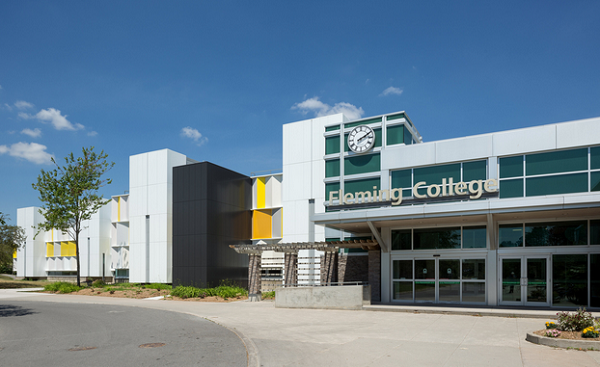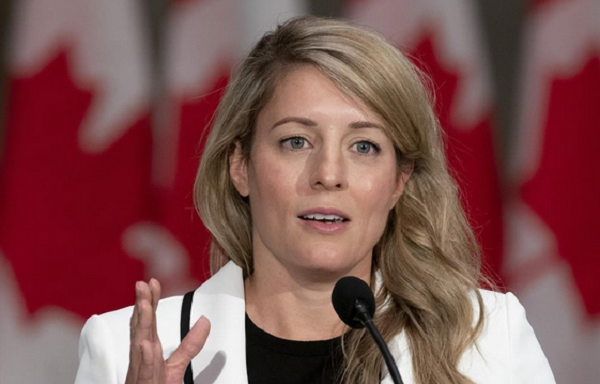Ontario public college slashing 29 programs following the drop in international students
An Ontario public college that is the first to announce cuts — slashing 29 programs — has dire warnings about what is happening to the post-secondary sector with the drastic drop in international students.
“There have been significant external events that have had an adverse effect on our college,” said Maureen Adamson, president of Peterborough’s Fleming College, in a letter sent to staff. “Most recently the federal cap on international students coming to Ontario, and the elimination of educational private partnerships.
“The related significant reduction to our budget has had a profound impact on college operations, and we are moving quickly to stabilize our institution and prepare for future years.”
The unions representing hundreds of staff say they were caught off guard by the school’s abrupt decision to cancel more than one in five programs in response to the declining international enrolment this fall, which they fear signal what’s to come in the sector.
Fleming expects to lose $40 million in tuition as other colleges have reported similar financial challenges. Sault College, based in Sault Ste. Marie, for example, is set to see a drop of 63 per cent in foreign students, affecting $40 million in revenues from its partnership with private college triOS.
On Wednesday, Adamson notified the faculty and staff of the affected programs about “the difficult, but necessary, evidence-based decisions” approved by the board of governors, becoming the first public college in Ontario to officially announce such cuts.
The cancelled programs included numerous business-related studies, environmental and forestry courses, and others in waste management, supply chain and heavy-equipment techniques. That leaves about 100 full-time programs still on offer, said Adamson, who declined a request for an interview.
“Current students are not affected by these decisions. Our priority will be to enable program completion of any student that is currently enrolled in any of the suspended programs,” Adamson told students in a statement on the school website.
While union representatives had been anticipating changes and cuts since last fall after Immigration Minister Marc Miller started floating the idea to rein in what he called an “out-of-control” international student program, they did not expect cuts of such magnitude.
“My inbox has been full,” said Marcia Steeves, president of OPSEU Local 351, which, along with another unit, represents 258 full-time and 428 part-time support staff at Fleming College.
“There’s a lot of questions, a lot of shock and a lot of fear for their jobs.”
The unions said they were not consulted in the process and are demanding that management justify its decisions.
“Without disclosure, transparency and collaboration, we have to question the validity of that data” the cuts were based on, said Liz Mathewson, president of Local 352, which represents 209 full-time and 400 partial-load faculty members. Fleming also has 800 contract faculty, who are not part of the union.
“Our focus now is, give us the data that we should have had and what you presented to the board that convinced the board that this was the right decision. We’re entitled to that.”
The number of study permits Ontario receives has dropped to just 141,000 this year from 239,753 in 2023 — under the federal government’s new cap to rein in the surging international enrolment, amid a housing crisis and concerns over the misuse of the foreign student program as a pathway for permanent residence.
For years, public colleges and universities have relied on international students as a revenue source for their operations with an ongoing tuition freeze in Ontario. The public-private college partnerships have been blamed for the influx of international students because they allowed for-profit institutions to offer public college credentials to international graduates, which gave them access to postgraduation work permits that potentially could lead to permanent residence.
But earlier this year, the province was forced to restore a moratorium on these partnerships and decided not to provide any of its rationed study permits to these partnership schools.
Fleming has partnered with Trebas Institute Ontario.
The unions at Fleming said it’s too early to know the number of the job losses at this point because there will be possible movement and bumping before they get to the point of layoffs for severance.
“If you look at our financial statements for the college, we had a $9 million surplus in 2023,” said Steeves. “I’m fearful if we don’t stand up and do something at our college now that (other colleges) will see this as a viable action.”
Peterborough Mayor Jeff Leal said he and other community leaders were informed by Adamson of the $40 million financial impacts from reduced enrolment and the need to cancel programs before the decision was made public.
“Anytime you eliminate a program, it does have an adverse impact on other people, not only locally from Ontario, but nationally, internationally,” said Leal, a former provincial cabinet minister in Kathleen Wynne’s Liberal government.
“International students work at jobs in our community. They contribute to the community and they allow our community to grow and ultimately, with their experience as students, they become great ambassadors of the city of Peterborough.”
However, Jacques Graveline, chair of the Student Administrative Council at Fleming’s Sutherland campus, remained optimistic, suggesting that college programs are regularly reviewed and revised to changing labour market demands. The program cancellations, he added, don’t necessarily mean the school is in dire financial straits.
“Sometimes you’re going to have to take out a program or suspend program temporarily because you have to revise it,” said Graveline, whose council represents about 7,000 students at the Sutherland campus, about half of them here on study permits.
“It doesn’t say it’s gone forever.”
This article was first reported by The Star












